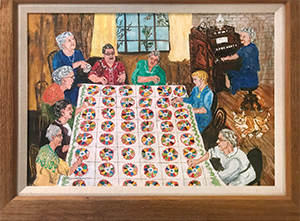Whenever I think about Mother’s Day, my mind always goes back to the time my father left our home in Memphis and did not return. He took his secretary with him.
My mother had studied art at an all-girls Baptist college in Mississippi and was not prepared to support a 6-year-old son and herself. She tried to teach art, but there was no money in it. A lack of income drove us to move from our nice neighborhood to Lamar Terrace, a federal housing project.
In those days, just as World War II was beginning, Mother went from one low-wage job to another, and in the process learned a lot of lessons she’d never dreamed of about power, about class and status, about men who accosted her with no provocation at all, one of them asking her once in front of me and before I knew what it meant if she would like to have a bedfellow.
After working in five-and-dime retail sales and briefly on a “war plant” assembly line, she got a job at the local utility company, working “in an office,” a distinction that seemed to mean a lot to her. A few years later, Mother made a great breakthrough when she learned to use a comptometer machine, which for its day was a super adding machine/ calculator, thus improving her status and her pay slightly. I remember being proud and impressed when at church she told people about her job.
“What do you do at the light company, Ruth?” the ladies would ask, those Southern women being somewhat suspicious of a divorcee as well as of any woman who worked outside the home.
“I am a comptometer operator,” she would answer, her voice rising in the middle of the sentence, imbuing it, I’m sure she thought, with special and substantial meaning.
But even a better job did not solve our money problems. I did not realize how bad those problems were until the day the local grocer intercepted Mother and me at the door and said we could not buy anything more until the bill was paid.
That experience—of being denied credit, of seeing my mother’s tearful embarrassment, of feeling hostage to someone’s control over what I could buy and even over what I could eat—stays with me still.

I really don’t know how she did it, but despite our circumstances, Mother pushed me to go to college, many times telling me that “they can’t take an education away from you.”
In her later years, she started painting again, changing from the landscapes of her student days to what she called her “memory pictures.” These were scenes from her life in rural Mississippi done in a primitive style. She began to exhibit in local galleries, and I persuaded her to take a collection of works to a large arts and crafts fair near Atlanta.
I had told her to put prices on each painting only to find that, with her usual modesty, she’d priced them so low that, using a marker, I simply added digits to change the prices. For instance, I would change her price from $35 to $335.
“You can’t do that, Jimmy,” she exclaimed. “Nobody will pay that.”
We drove home the next day with an empty station wagon. It was wonderful to see her so happy, a professional artist at last. At one point, I persuaded her to put aside some paintings for the family, and several now hang in my home.
James A. Autry of Des Moines is a well-known author, poet, musician and business consultant who has written 15 books on such topics as gratitude, servant leadership and his Southern boyhood. This essay is adapted from his book “Confessions Of An Accidental Businessman.”








